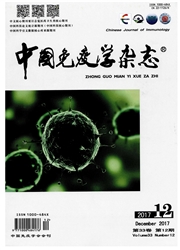

 中文摘要:
中文摘要:
目的:观察抗β1-肾上腺素受体(β1-AR)自身抗体对在体大鼠心肌细胞的致凋亡作用,并探讨其可能的信号转导通路,以阐明该抗体参与心衰发生发展的病理机制。方法:用β1-AR细胞外第二环合成肽段免疫抗β1-AR自身抗体阴性大鼠(9周),定期检测大鼠的血清抗β1-AR自身抗体滴度、心功能、心肌组织凋亡现象和caspase-3,8,9活性。结果:(1)免疫组大鼠的血清抗β1-AR自身抗体滴度逐渐升高并维持于高水平[1∶(1280±0.07)];对照组始终在1∶10左右;(2)TUNEL和琼脂糖凝胶电泳显示免疫组大鼠在免疫3、4、5周心肌组织发生明显凋亡,caspase-3,8活性增高,免疫7、9周心功能明显下降,对照组未见异常。结论:抗β1-AR自身抗体可能通过激活死亡受体途径促进在体大鼠的心肌细胞发生凋亡,最终引起心功能下降。
 英文摘要:
英文摘要:
By using a rat immunization model, we designed to investigate whether the autoantibody against β1-adrenoceptor( β1-AR) was capable of triggering apoptosis in cardiomyocytes in vivo and, if so, to explore the possible signaling pathway by which the autoantibody may contribute to myocardial apoptosis. Methods:Healthy Wistar rats without the autoantibody against β1-AR were chosen and immunized with the synthetic peptide corresponding to the sequence of second extracellular loop of β1-AR(9 weeks). The titers of the anti-β1-AR autoantibody were detected periodically using ELISA. Apoptosis in the cardiac tissue was assessed by TUNEL technique and agarose gel electrophoresis, the activities of caspase-3, 8, 9 were also detected by colorimetric assay, and the cardiac function was evaluated periodically. Results: ( 1 ) One week after initial immunization, the mean geometric titer of the antibody to β1-AR group was less than 1: 10. Subsequently, the mean antibody titer gradually raised to [ 1: ( 1 280±0. 07) ] after intensified immunization and maintained on this level within 9 weeks. In contrast, the mean antibody titer of control group remained below 1:10 during the whole immunization procedure. (2)TUNEL and agarose gel electrophoresis showed significant cardiomyocyte apoptosis on 3rd,4th,Sth weeks after immunization in the β1-AR group, the activities of caspase-3 and caspase-8 were found increased. Cardiac function at 7 to 9 weeks after immunization decreased remarkably. However, no abnormality could be seen in control group. Conclusion :These results demonstrate that the autoantibody could induce cardiomyocyte apoptosis in vivo via death-receptor pathway, and suggest that the autoantibody may be involved in pathogenesis of cardiac dysfunction.
 同期刊论文项目
同期刊论文项目
 同项目期刊论文
同项目期刊论文
 期刊信息
期刊信息
